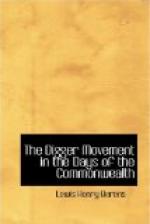The celebrated work by Chillingworth, The Religion of Protestants, a Safe Way to Salvation, published in 1637, and of which two editions were issued within less than five months, also deserves special mention here. His fundamental position may be well summarised in one of his own sentences—“I am fully assured that God does not, and therefore that man ought not to require any more of any man than this, to believe the Scriptures to be God’s word, to endeavour to find the true sense of it, and to live according to it.” Even more fully than Hooker, Chillingworth accepts reason as the all-sufficient guide of human conduct, and admits no reservations that might limit the sacred right of private judgement. The essential difference between these three eminent writers is admirably summarised by Buckle in the following words:[21:2]{2} “These three great men represent the three distinct epochs of the three successive generations in which they respectively lived. In Jewel, reason is, if I may so say, the superstructure of the system; but authority is the basis upon which the superstructure is built. In Hooker, authority is only the superstructure, and reason is the basis. But in Chillingworth, whose writings were harbingers of the coming storm, authority entirely disappears, and the whole fabric of religion is made to rest upon the way in which the unaided reason of man shall interpret the decrees of an omnipotent God.”
In fact, Chillingworth’s great work may well be regarded as the last word of the Protestant Reformation in England.
FOOTNOTES:
[15:1] According to Beard, The Hibbert Lectures, 1883, p. 119, “It was a mediaeval maxim, which no one thought of questioning, that the language of the Bible had four senses—the literal, the allegorical, the tropological, and the anagogical, of which the last three were mystical or spiritual, in contradistinction to the first.” The learned Erasmus, who lived and died a devout Roman Catholic, seems to have accepted this allegorical interpretation of the Scriptures. Of interpreters of the Holy Scriptures, he recommends those “who depart as far as possible from the letter.” Erasmus, Opp. (Enchiridion), v. 29, B, C, D. Quoted by Beard, p. 120.




